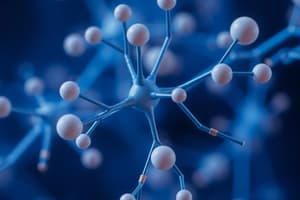Podcast
Questions and Answers
What are benzodiazepines commonly used for?
What are benzodiazepines commonly used for?
- Muscle spasms
- Chronic anxiety disorders
- Acute anxiety disorders
- Both A and B (correct)
Benzodiazepines can be used for conditions other than anxiety.
Benzodiazepines can be used for conditions other than anxiety.
True (A)
What neurotransmitter do benzodiazepines increase the action of?
What neurotransmitter do benzodiazepines increase the action of?
Gamma-aminobutyric acid (GABA)
Which of the following is NOT a contraindication for benzodiazepines?
Which of the following is NOT a contraindication for benzodiazepines?
What is the most common undesirable effect of benzodiazepines?
What is the most common undesirable effect of benzodiazepines?
Paradoxical reactions to benzodiazepines are common.
Paradoxical reactions to benzodiazepines are common.
Benzodiazepines are potentially __________ and addictive.
Benzodiazepines are potentially __________ and addictive.
What can occur upon tapering of doses or discontinuation of benzodiazepines in elderly patients?
What can occur upon tapering of doses or discontinuation of benzodiazepines in elderly patients?
Study Notes
Benzodiazepines
- First-line treatment for acute and chronic anxiety disorders.
- Most widely prescribed class of anxiolytic drugs, offering various therapeutic effects.
- Used for additional conditions: ethanol withdrawal, insomnia, muscle spasms, seizure disorders, and adjunct therapy in anesthesia.
- Commonly prescribed in conjunction with depression treatment due to overlapping symptoms.
- Contraindications: known drug allergy, narrow-angle glaucoma (risk of mydriasis), and pregnancy (potential teratogenic effects).
Mechanism of Action
- Anxiolytic drugs reduce anxiety by decreasing overactivity in the central nervous system (CNS).
- Benzodiazepines target the brainstem and limbic system to exert their calming effects.
- These drugs enhance the action of gamma-aminobutyric acid (GABA), an inhibitory neurotransmitter that blocks nerve transmission in the CNS.
Buspirone
- A miscellaneous anxiolytic with a unique classification distinct from benzodiazepines.
Adverse Effects
- Common side effects include excessive CNS depression and potential hypotension.
- Notable paradoxical reactions: rare instances of hyperactivity and aggressive behavior, particularly in children, adolescents, and the elderly with dementia.
- Rebound disinhibition can occur in the elderly after tapering doses, leading to initial sedation followed by agitation and confusion.
- All benzodiazepines are habit-forming and classified as Schedule IV controlled substances.
- Requires careful dosage management to minimize dependency and maximize symptom relief.
Studying That Suits You
Use AI to generate personalized quizzes and flashcards to suit your learning preferences.
Description
This quiz covers the critical role of benzodiazepines in treating anxiety disorders and related conditions. It explores their mechanism of action, therapeutic uses, and contraindications, including comparisons with other anxiolytics like buspirone. Test your knowledge on this essential pharmacological class.





